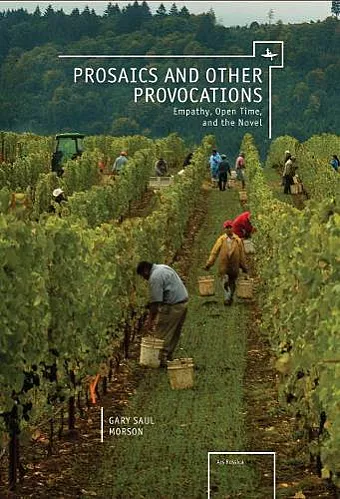Prosaics and Other Provocations
Empathy, Open Time, and the Novel
Format:Paperback
Publisher:Academic Studies Press
Published:30th May '18
Currently unavailable, and unfortunately no date known when it will be back

This far-ranging study develops Morson’s concept of “prosaics,” which stresses the importance of ordinary events and the novel’s unique ability to portray them. Arguing that time is open and contingency real, Morson develops a “prosaics of process” showing how some masterpieces have found an alternative to structure. His well-known pseudonym Alicia Chudo, the inventor of “misanthropology,” explores the disturbing philosophical content of laughter, disgust, and even empathy. Northwestern University’s most popular professor, Morson attributes declining student interest in literature to current teaching methods. He argues in favor of showing how literature fosters empathy with people unlike ourselves. Ever playful, Morson explores the relation of games to wit, which expresses the power of the mind to triumph over contingency in the social world.
“Read this book. While it is inspired by (and offers brief but illuminating studies of) the masterworks of Tolstoy and Dostoevsky, the volume’s relevance greatly transcends Russian literature, indeed it offers a corrective to much (one is tempted to say all) thought, whether that includes technological or economic history, animal or language speciation, or deconstructing the Old Testament. . . . Readers who cherish various theories of literature or even science itself will find Morson a contentious, amusing, and always-eloquent conversationalist, who argues for a “counter-tradition,” a life affirming perspective that opposes all-encompassing laws and patterns with details, processes, and especially our consciousness of the present moment with all its innumerable potentials.”
— Brett Cooke (Texas A&M University), in the The Russian Review, January 2015 (Vol. 74, No. 1)
“Professors in undergraduate and especially graduate courses offered, and perhaps still offer, dire warnings against treating literary characters as though they somehow resembled real people or focusing on the writer’s intent in producing a work. Evaluation—declaring a work to be “good” or “bad”—was to be abjured. Morson cheerfully, even aggressively, violates these prohibitions. He is not afraid to single out those writers and works that he calls great, to consider the views of authors on literature, and to use novels as a means for probing ethical issues that individuals may face in real life.”
— Barry P. Scherr (Dartmouth College), in the Slavic and East European Journal, 58.3 (Fall 2014)
ISBN: 9781618118097
Dimensions: unknown
Weight: unknown
300 pages